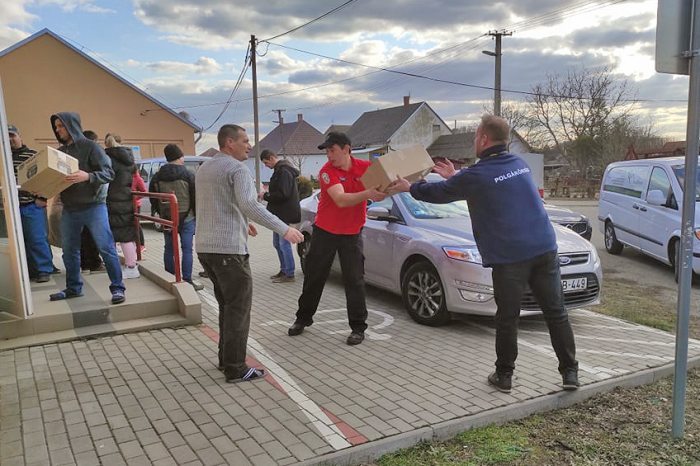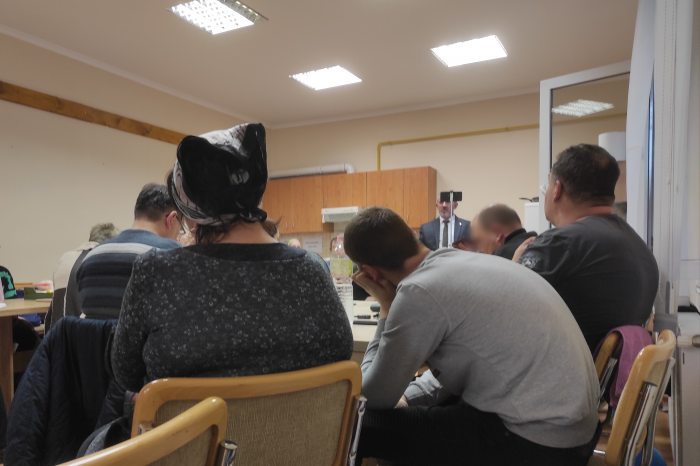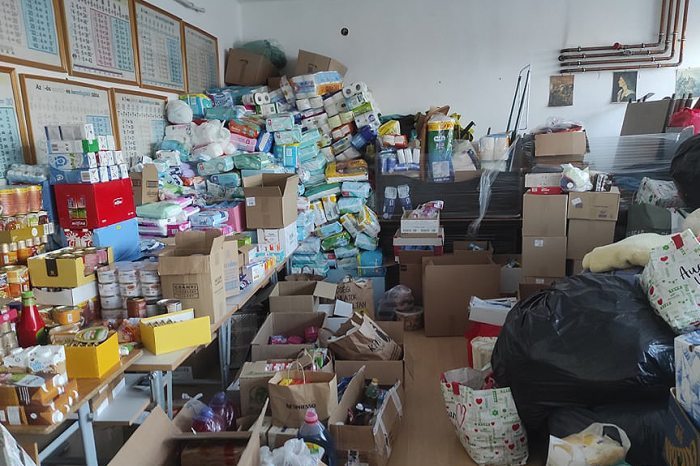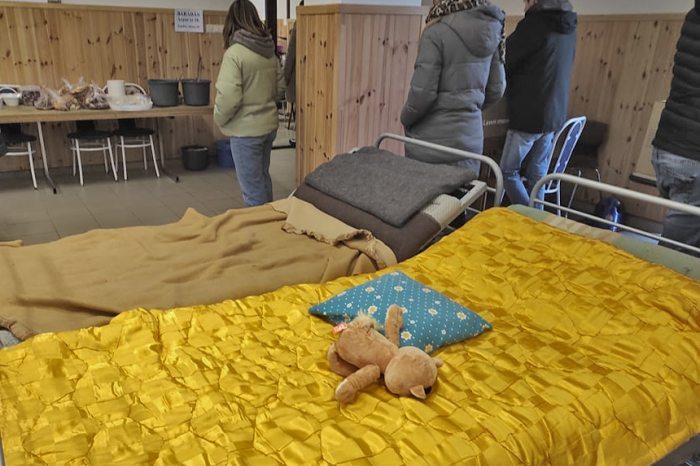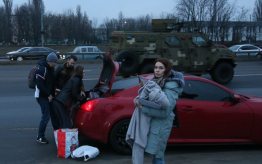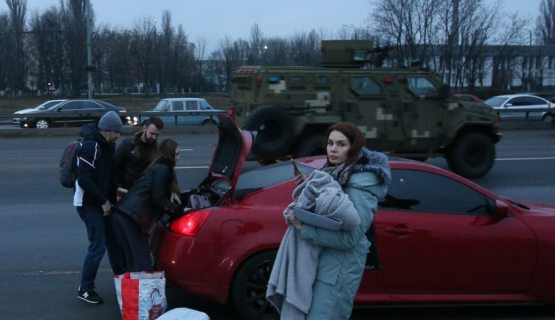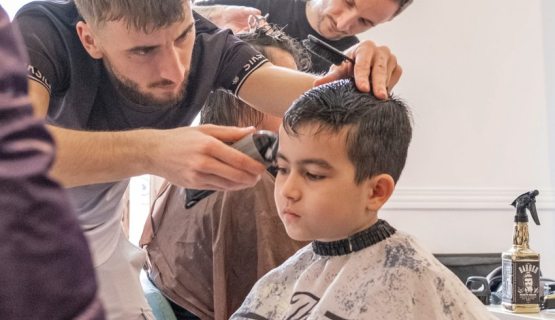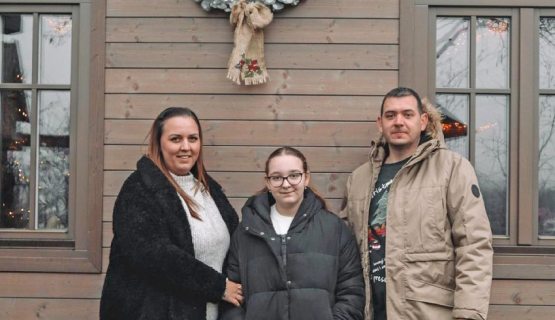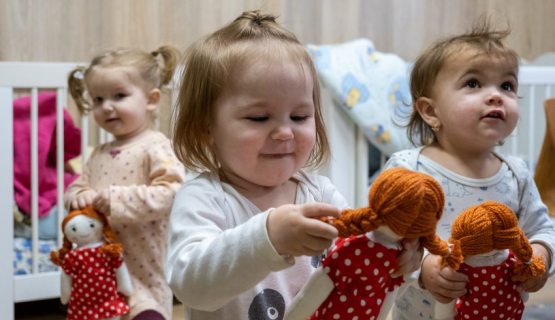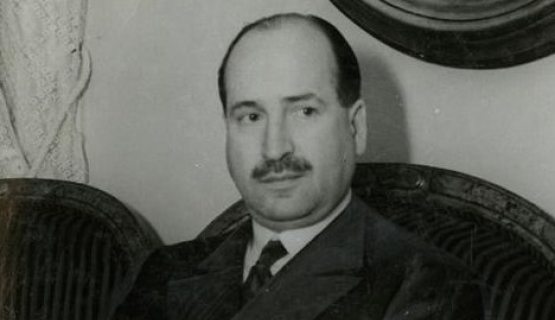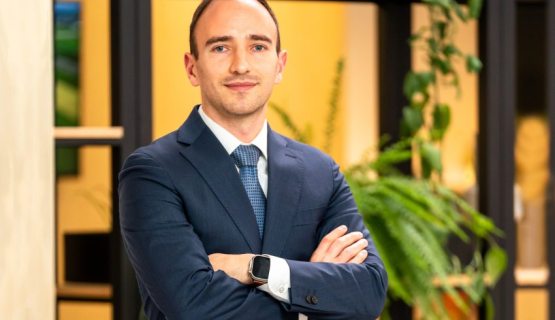We went to the Ukrainian-Hungarian border – ”The desire to give has not diminished”
Barabás is on the Hungarian-Ukrainian border, Papos about forty kilometers away. Although we don't hear much in the news about these smaller villages closer to the border crossings, where everyone knows everyone, the people who live there and the volunteers who support them are doing their part to help those fleeing the war. With volunteers from Budapest and a large number of donations, we recently set out East, and what we found there took away and restored our faith in humanity at the same time.
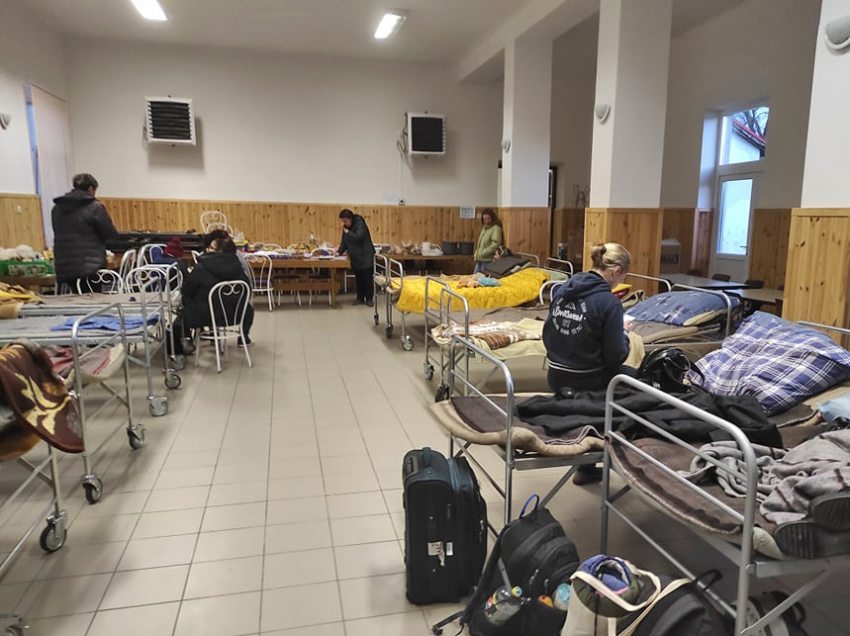
Volunteers joined forces
"It's the first time I've driven this car," remarks Miklós as we bump along the motorway. The wind occasionally tilts the tall van, which has been so loaded with donations in front of the Klebelsberg Culture Curia that the only way to close the door is the classic "Quickly pull your hand away and close the door" method. "I think you're doing fine!" - I reassure my fellow traveler, whom I've known for barely ten minutes. Half an hour ago, I didn't even know I was going to spend the day at the Ukrainian-Hungarian border, but Miklós' morning was just as spontaneous.
We are heading towards Papos. The village, which is two and a half hours' drive from Budapest, is not much in the news as it is not a border village, but the mayor told the organizer of the action that a donation was needed because refugees were being housed in the community center, and the civilians started organizing immediately. "Where did you get the van?" - I ask Miklós. "A guy left it here, left the keys and the registration papers at the reception, and said that volunteers could use it for three days," explains the father of two, who found the call for helpers on the Facebook group of District II. "Originally they were going to go with two cars, but the FB post prompted several people to offer their cars and there was a request in the morning if anyone could drive this one. I volunteered," continues Miklós, who also tells me that several families were accommodated in Papos, many sleeping on the ground, for whom they collected mattresses, bedding, and food, among other things.
Lost in thought, I look out of the window, my eyes flickering as I follow the passing apple trees of Szabolcs. On the way, of course, we talk about the war, and how neither of us would have imagined a few days ago that we would be fellow travelers in such an operation.
One of the greatest strengths of volunteers is these fast-weaving yet strong connections based on unconditional trust, creating a dense web in which strangers treat each other as friends.
"We are a tight-knit community"
When we arrive at Papos, packing is already in full swing. Locals and volunteers from far and wide are lined up, passing bags and boxes to each other.
I learn from the mayor of the village of around 900 people that the refugees needed mattresses, blankets, and pillows, as well as toiletries, non-perishable food, and children's toys.
He says that the local community is very tight-knit. There is a lot to be proud of, there is a lot of unity in the community, donations keep coming in and many people have come to do their bit in person.
"We're not a border town, so we don't feel the war yet, only that people are coming who are depressed about having to leave their life's work. They are crying, they have family members, parents, brothers, and sisters left behind, they just came with a suitcase," says Béla Illés. The mayor was told by Pastor Viktor Bocskor on the day the war broke out that several of his congregation needed shelter. "I offered the community house for this purpose," continues the mayor, "It was a very difficult start, we had to get matresses, toilet paper, other practical things for daily needs. A friend of mine connected me with Tamás, who told Krisztina Szalay that a collection was needed, which apparently went well. It's emergency aid now, when the war broke out, we had to act immediately," says Béla Illés, adding that fortunately, they can now concentrate more and more on planning ahead.
“It's not an easy situation, because we have to find a way to manage their lives, create jobs, if they are going to live here for a longer period of time they have to be able to get by somehow. The children have to go to kindergarten and school, and we have to and can help them with that too.”- adds the head of the village.
I spot Krisztina Szalay among the people in the crowd. The well-known actress has a strong will to do something. She is also the main coordinator of this civil initiative in District II. I'd like to ask her how she managed to mobilize so many people in such a short time, but I'll have the chance to do that later because after the packing is done, I'll be directed to the refugee shelter, which is only a few minutes walk from the place that can be used as a temporary warehouse by the community.
"Your own, if they fall, will fall into your hands"
As we approach the house, we hear fragments of speech through the walls, and with each step, it becomes clearer that there is a church service going on inside. "...Thousands may fall, tens of thousands may perish, but your people will not fall, and your people, if they fall, will fall into your hand, which is the hand of salvation," prays the pastor.
I look around the room. The sight is shocking. Previously, I had only experienced the conflict first-hand through the hard-working volunteers, but seeing the community center has put a face to the war. Immediately, my gaze falls on the children playing on the mats on the floor. Their parents are listening to the words of their spiritual leader, men, and women, old and young, seeking comfort in the words of the pastor. The service ends with a communal singing. It is moving to see Hungarians of Ukrainian citizenship singing in Hungarian in Papos, not knowing how their future will unfold. It is then that I become truly aware that we have not managed to avoid this war, and that Hungarians are already involved in it. "Receive me, Jesus, ever closer", the faithful sing with a pure heart in their mother tongue.
Viktor Bocskor, the pastor of the Evangelical Christian Church, who came to Papos from Transcarpathia twenty years ago, has lived his life as a commuter, spending two days in the village and five in Transcarpathia before the outbreak of the war. "This congregation you see here was in Transcarpathia. We gathered there several times a week. These people have known each other for a long time, we have spent retreats together before, talking about the Bible and God's truth. These occasions helped us to make the present time together not burdensome for them. Of course, when we used to gather together, we didn't meet in this uncertainty, everyone knew where they were going home. We can no longer look back, although we might want to. It is not because of our desires that this is not possible, but because home is still a hopeless prospect. So now we look upwards, God, what are you showing us next?" says the pastor, who looks back on the past sixteen years of the church as God's way of preparing them for what is to come.
”We arrived from Berehovo district at midnight on Thursday. We thought for a long time about whether we should go, and the fact that we finally decided to do so is also due to our attitude towards God."
„Believers must look first to where they can serve God, second to the interests of those entrusted to them, and third to the church. We didn't have any plan, we didn't think this would happen, we prayed a lot that it wouldn't happen. We would love to go back, but it depends on the circumstances." –says a father from Transcarpathia.
As I look into the eyes of the families, I see sadness and serenity, the latter because they are holding together, feeling the strength of community. When several dozens of refugees are housed in a community centre, there is no intimacy, it is difficult to retreat, and it matters a lot how relationships develop between people. But in this community, no one has anything to fear, it's like a big family coming across the border together. The pastor wrote to the congregation on Thursday morning saying the border is still open, come while you can. The people considered this warning and set off at 5 PM. The last family crossed the border at 11.30 p.m. Ukrainian time, and half an hour later it was closed, and men aged 18-60 have not been allowed to leave the country since. “We came together, not to cross the border and scatter across the country or to other countries where friends and acquaintances live. Fifty-four of us crossed in total, three of us staying with families, the rest of us sheltering in two camps ten kilometres apart” – adds Viktor Bocskor. I cannot ask the pastor any more questions because they are waiting for me. Kriszta tells me that we must continue on to Barabás, closer to the border, where we must transfer things that are needed there. I am in Krisztina's car, with her adult daughter Lulu Cserna (also an actress) in the passenger seat. Krisztina drives the big van calmly and with a concentration towards the Ukrainian border.
”My friends were conscripted”
We see a man standing by the road. "Where are you going?" - Kriszta asks rhetorically, then slows down and picks up the hitchhiker. It turns out that the man is on his way to the border to wait for his children, who are crossing today. We can't drive him for long, we have to go in another direction. I realize that for Kriszta this is not the stage of a theatre, she is really the type who picks up hitchhikers without hesitation to ask what she can do to help. On the twenty-minute drive to Barabás, we finally get a chance to talk a bit about how the Klebelsberg Culture Curia was filled with donations by Sunday morning.
"It started by putting out a call for Facebook groups in District II that we might be needed. Then I started making phone calls in the area to see what was specifically needed, because it's important to know that, so that we can take what is needed and to where the need is. Here, for example, there are no babies, so diapers are not requested, but we know that they are needed elsewhere," says Krisztina as her daughter tell her where to exit the roundabout. I'm bumbling in the back seat, leaning forward to better understand what she's saying.
"Of course, people often like the posts, but what happened here is much more than sympathy. The desire to give has not diminished. We organized the cars during the night, there was so much stuff that we planned to have two cars, but we ended up having to go with six."
"You see, they're still applying to deliver. When we were packing up at the Curia, a man from Transcarpathia came up to us and said he'd be happy to translate. Last night at 11 o'clock the Hungarian Reformed Church Aid called me from Nyugati Railway Station, saying there was a family of seven, Ukrainians, they don't speak Hungarian. They really need an interpreter for these things. Fortunately, the situation was resolved in ten minutes. The people of Transcarpathia say that there will be a big movement now, the next wave will come, and it will be bigger than this one, because many people have not been able to leave until now, and there certainly will be those who have to escape," adds Krisztina. Compared to the stereotypes people have about actresses being addicted to the spotlight, it's not at all important for her to be in the pictures. It's particularly nice to see this after witnessing a scene at the border where a volunteer asks another volunteer to take a photo of him delivering a package, which he then immediately uploads to the news feed. He had to click several times to get the right angle.
Donations continue to arrive in Barabás. As I'm packing the boxes, I have to stop for a minute among the piles of boxes, because I've never seen so much stuff crammed into one place.
I learn from the mayor that the community has had a busy few days, only experiencing the war so far by receiving desperate people.
"People coming from further up North say they see and hear explosions. The news of the war has moved many people, many are coming. We have made a shelter, there is a lot of support, we receive a lot of donations. We are also working to transfer some of the food aid to Transcarpathia because there is also a need for food and duvets there."
- says Gábor Daróczi, as his children, who have been chasing him around, snuggle up to him. There are only a few people in the shelter at the moment, but locals say the situation is constantly changing. Just a short time ago, the room was crowded, a large group of Belarusians had just left for Warsaw, most of the refugees have found a ride and are on their way inland or abroad, and volunteers are bracing for the next wave.
A little boy plays with a stuffed dog on the camp bed. I step up to him and crouch down. "Your dog is cute, have you named him yet?" - I ask. "It's not my dog, I found it here," he says with downcast eyes. "Then you can keep it if you want, someone meant it for you when they put it in this box" - the boy's face brightens, happy to play. I ask the family what's out there. "Horror, horror, World War III is breaking out!" - the boy exclaims, his mother patting his head affectionately. She explains that they came from Transcarpathia, her husband works in Hungary, and is waiting for the family to be reunited. Her transport is already arranged, but she is very sad. It was difficult to leave her life behind, but they decided to flee without hesitation.
"There was nothing to wait for," she keeps saying.
"In the comments section, they keep saying that there is no need to flee from Transcarpathia, that they don't even take the men away, and that you can't even see a tank," I say. "This is not true. There is a reason to flee," she answers angrily. "I have friends who were taken to Kyiv to fight," says the young girl in the corner. Her friends were taken to fight at the age of 18 or 19 without any previous training. "News comes in that some have died. Many men have been taken away," she continues, "People are afraid. It's very intimidating, everyone has left, the villages have been emptied," she adds sadly, and she also wonders if there will be nowhere to go back to.
Some of the refugees say that there are Hungarian settlements in Transcarpathia from which they have left, and that Ukrainians have taken their place in abandoned houses. They fear for their belongings, their family memories, the life they left behind, not knowing what they will find when they go home and whether they want to go home at all. We're trying to find out if we can take someone to Budapest, but the people in the shelter are all waiting to be picked up. Food is available, the volunteers have done a great job here too, the team is coordinated by the local notary.
The civilians are tired, but their drive is unabated, whether Ukrainian or Hungarian, Belarusian or Nigerian, they are trying to help everyone equally.
Those who want to volunteer or donate are advised to inquire before they go and to consult the coordinators of specialized organizations. Many people have lost hope because of the war, and we are living our days in uncertainty, not knowing where the situation will escalate, but there is hope in these actions, a boundless will to act that restores our faith in humanity.
The pictures have been taken by the author.
